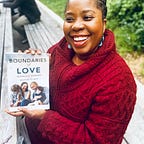Black Panther and “Growing Up African” in Chicago
I grew up in Chicago in the 1980s and 90s in the days of Christie Brinkley as the American beauty ideal. The Jherri curl was the hairstyle of choice for many African Americans. In those days, people from other cultures spoke their native languages within their communities and family spaces. If surrounded by Americans, it was best to speak in hushed tones or you risked being berated for not assimilating into English-only America. Teachers urged parents to speak to their children in broken English rather than in their fluent native tongues.
In the U.S. age of Atari and then Super Mario Brothers, it was not cool to be African. Africans were malnourished children with distended bellies and flies on their faces. Africans had bones in their noses and wore grass skirts dancing around large flames. Everyone tactfully scraped at tingles and dry skin from harsh Chicago winters, yet it was only Africans who were “Booty Scratchers.” Africans were the beneficiaries of funds from rock concerts. Africans had great grooves, but needed a white man to bring it to “civilization.”
Africans were also too much.
The haughtiness of Nigerians annoyed people who knew nothing about the most populous, oil-rich nation in Africa. When Nigerian community members greeted one another in public, people stared at the foreign tongues, the laughter, the CHAI!, AWOOO!, and other exasperations.
Our food was extra. Living in a high-rise in Chicago, our English-speaking neighbors wondered loudly, “What is that SMELL?!” as they walked past our door in our high-rise. From the next room, I could sniff the difference between fried ripe plantains, boiling goat meat, or tomatoes and peppers hitting heated oil.
But, when we dressed up for “parries” on Saturday, we looked good and we knew it. Our Puerto Rican, Eastern European, and Mexican neighbors stared at us. Our African American neighbors asked, “Where are you from?”
“Nigeria!” My parents said proudly. They ooooh’d and ahhhh’d as we descended in the elevator or waited in the lobby for Daddy to pull around. Despite all of the building’s Nigerians dressed up in native attire, we were all going to different parties. We had our own Igbo, Yoruba, and smaller groups’ community celebrations. However, we were all going to a “parry.”
But the rest of the week, our clothes smelled like stockfish. My brother was bullied because of smelling “like a woman.” White kids asked me if my parents swung from trees. When I visited Nigeria as a child, I came back with darker skin and fresh braids. I was black as hell, so I did not care when none of the children recognized me. Seeing Africa, my homeland, twice as a child, meant that those fools at school could tell me nothing.
I was not surprised when I heard that a girl from East Africa committed suicide after enduring bullying from classmates. The rumor was that classmates taunted her for facial scars that physically “othered” her. Were they proof she had escaped certain death? Tribal marks? Wounds from a childhood disease? I never found out. I just knew that for many Chicagoans, Africans were the worst type of black you could possibly be.
I wrote a poem for English class that my Japanese-American teacher wanted me to read at an elementary school assembly. Afterwards, two white parents congratulated me on how well I had done. They asked my African American teacher how I had done such a good job.
“Yes,, well, she’s Nigerian,” my teacher explained.
“Oh,” they responded, satisfied by his response.
“I was born here, but my parents were born in Nigeria.” I could not let those hours of writing and practicing be tossed aside by a flippant “Nigerian” explanation. Yet, my sense of foolishness grew as I walked away. From students, Nigeria had made me immune, but not from teachers, especially of my color.
While Saved By the Bell was king, black rappers wore ankhs and Nefertiti-style headdresses. The red, black, green flag and the letter X were everywhere. South African apartheid was the cause du jour. Afrocentrism was hip. Africans were not. Coming to America and The Barbershop series meant that Africans, especially those from West Africa, were grinning idiots.
An Africanized Sambo knew nothing about life in big, dangerous cities, despite the continent’s own megalopolises. Simultaneously, people in my community, were thrust from village life to Chicago life, were scared by the horrible things of “America” that had been brewing for decades in Lagos, Ibadan, and Enugu.
As we children of African immigrants and immigrants tell our stories in the West, there is less stigma against being African. When I saw Black Panther with it’s own AWOOO!!!s and CHAI!!s I loved how full circle we had come. I’ve known that Africans are amazing. (Nigerians ask, “Was there ever any doubt?”) I’m now glad that more peoples, including my black brothers and sisters from across the diaspora, my very distant cousins, can see it too. Black Panther has changed the game for all of us.
